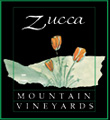Our Newsletter
Stay up to date with what we are working on, talking about and exploring. From grapes, wine, travel and fun!
If you would like to receive an email when we add a new newsletter, contact gary@zuccawines.com
RAVE Conference at UCD
 Does filtering wine influence flavors? Not according to the research done by Dr David Block at UCD. He tested both white and red wines and filtered them through a variety of different filters; pad, depth and membrane of different sizes.
Does filtering wine influence flavors? Not according to the research done by Dr David Block at UCD. He tested both white and red wines and filtered them through a variety of different filters; pad, depth and membrane of different sizes.
Using a trained sensory panel of experts, there was no change in flavors between the control and the different filters. That is good news. We filter to assure clarity and microbial stability. That insures that all the bugs are out of the wine and there will be no additional fermentation in the wine after bottling. You don't want any corks popping out in your cellar, do you? Now we know that there will be no change in flavors due to the filtration except those flavors that change over time in the cellar (that we all want) I love good news.
What is dry?
I have a number of customers who come into our tasting room tell me that they find some of the wines to be dry. My usual response is “I see, or “oh” because, unless they are referring to our Syrah Port or Tesoro, all of our wines are dry. What I these customers are telling me is that the wines have a drying effect in their mouth. Not wanting to be a wine geek, I don’t go into my lecture of the difference between dryness, a measure of sweetness and astringency, a measure of tannin.
Sweetness is a measure of taste. A dry wine is a wine that has no (or <.5%) residual sugar (RS); an off-dry wine has about 1%, RS; and a sweet wine has >2% RS. Our Syrah Port has about 6% RS.
Astringency is not a measure of taste; it is measure of how the wine feels in the mouth. According to Marian Baldy in the University Wine Course, “…young red wines with high tannin levels are astringent and create a rough sensation: their tannins react with proteins in our saliva and on the surfaces of the cells lining our mouths and on the surfaces of our tongues to dry them out and create a puckery, rough sensation as our now-unlubricated mouth parts chafe against each other. Moderate astringency can nicely offset the richness of a fatty meal, but higher levels make wines unpalatable and call for patience: during bottle aging the astringency will diminish (Baldy, p.25).”
Coffee and tea also have high levels of tannin. That’s why lots of people reduce the tannin effect by adding a bit of milk, that has fat and protein, to their coffee or tea.
____________________________________________________________________
The University Wine Course: A wine appreciation text & self tutorial. (1997). Baldy, M. W. The Wine Appreciation Guild.
Talks with the growers
We had lunch and some really informative talks with 2 of our growers recently. Neither had problems with Botrytis (bunch rot) this last harvest although it was a problem in some areas. They thought it was due to location and open canopies that allowed good air circulation. We always have a good breeze where we are that keeps down our incidence of mold. We will talk to a grower in Amador County that has head trained vines with poor air circulation soon. Botrytis was a huge problem for him. I am anxious to hear how he is going to combat it this year. I'll let you know what he says.
Recent Posts
-
August 21, 2023
-
August 19, 2015
-
February 5, 2015
-
January 12, 2015
-
January 2, 2015
-
September 22, 2014
-
March 13, 2014
-
April 29, 2013
-
March 13, 2013
-
February 28, 2013
